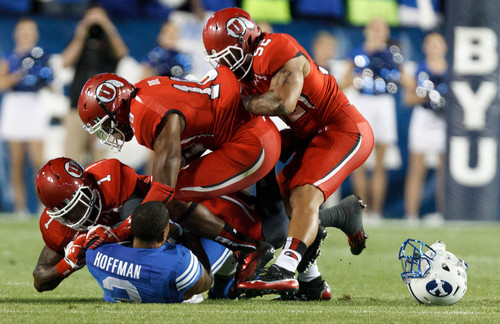This is an archived article that was published on sltrib.com in 2013, and information in the article may be outdated. It is provided only for personal research purposes and may not be reprinted.
Provo
Utah safety Michael Walker's diving interception made sure of two things: "Fourth-and-13" would not find a place in BYU lore and the Cougars would wonder what they have to do to ever win a rivalry game.
BYU quarterback Taysom Hill will have six days to prepare for his next game and a lifetime to think about losing to Utah in his only opportunity as a starting quarterback.
In the wake of Saturday night's 20-13 loss at LaVell Edwards Stadium, this is BYU's reality: The Cougars will have to live with this defeat for a long, long time.
A fourth straight loss to Utah, compounded by the two-year break in the series, creates a problem for BYU that beating Middle Tennessee simply cannot solve.
BYU lost again because Hill and the offense could not turn 443 total yards into more than 13 points, and because the defense gave up two huge plays in the first half and a critical touchdown in the fourth quarter.
The Cougars (1-2) were highly motivated for the rivalry game, their royal blue throwback uniforms looked sharp and the fans responded by packing the stadium 15 minutes before kickoff, which is unheard of in Provo.
But they still could not beat Utah.
The Cougars battled valiantly in the fourth quarter, driving to the Utah 38 in their quest for a tying touchdown, but Ute linebacker Jacoby Hale sacked Hill, who then threw the fourth-down interception.
So the issue of the day is what's left to define BYU's season - in a positive sense? The possibilities include games with Utah State, Boise State, Wisconsin and Notre Dame, presumably to be followed by a meeting with a Pac-12 school in the Fight Hunger Bowl. Yet none of those potential victories could match the meaning or value of beating Utah, especially under these circumstances.
BYU associate athletic director Chad Lewis spoke poignantly in a Tribune interview last week about the satisfaction of finally beating Utah as a senior in 1996 after three losses, and how thankful he was to have that experience. Kyle Van Noy and other seniors walked off the field Saturday without any of those feelings — as did Hill, making his only start in the rivalry as a sophomore.
The Cougar offense actually generated 217 total yards in the first half, but could not produce any consistency — or points, obviously. BYU endured four sequences of three-plays-and-out and failed to score when Justin Sorensen missed a 34-yard field-goal try.
BYU's defense allowed 286 yards in the first half, with 65 coming via James Poole's run that led to a field goal and 74 on Travis Wilson's pass to Dres Anderson.
Even while losing star running back Jamaal Williams to an injury, the Cougar offense showed some life in the third quarter with two nice drives. But they resulted only in two Sorensen field goals, after Hale's sack of Hill on a third-and-goal play.
BYU then blew a fourth-quarter scoring chance, turning the ball over on downs after JD Falslev's 58-yard punt return to the Utah 13.
The Cougars cut the lead to 20-13 on Michael Alisa's 1-yard run with 5:13 remaining, but that was all.
It would be a mistake to underestimate how much this victory means to Utah, but there's no doubt that the loss is more devastating to BYU. The Cougars are the ones who wanted to keep playing the rivalry game annually. In their independent state, they need it more. But the truth is that as of Saturday night is there's nothing they can say or do about Utah's in-state status until September 2016, at the soonest.
The rivalry game determines "how you're standing in the community for that year," former Ute coach Ron McBride said recently. "If you win the game, you could walk around with a swagger in your step. If you lose, you could dig a hole and not come out too much."
In this case, the effects of the loss will last three years — or at least six years, from a BYU perspective.
Twitter: @tribkurt



